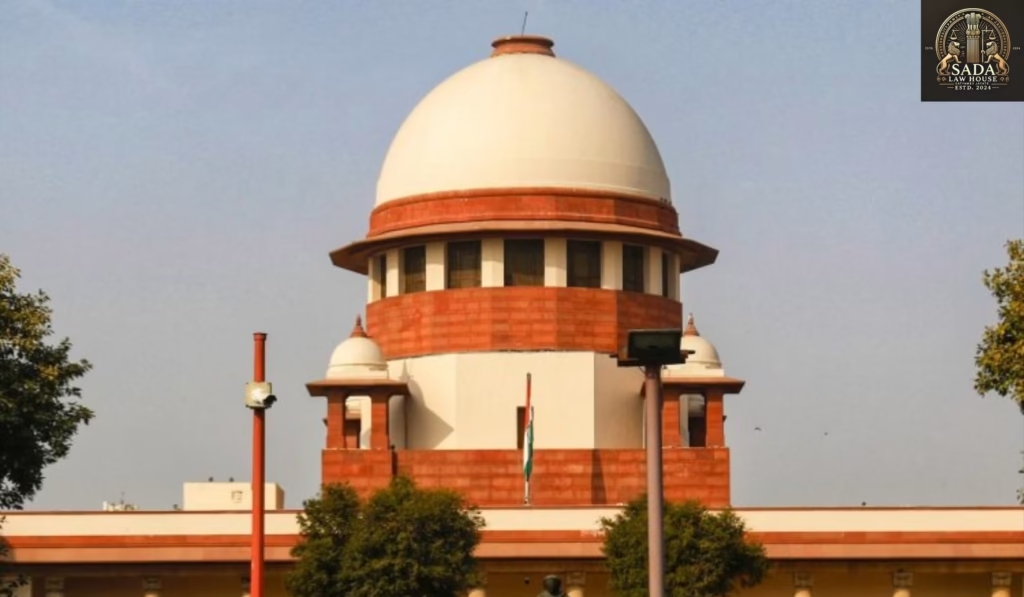Supreme Court Reviews CAA Rules 2024: Fresh Petitions Challenge Citizenship Law on Constitutional Grounds
Trending Today Supreme Court Reviews CAA Rules 2024: Fresh Petitions Challenge Citizenship Law on Constitutional Grounds Supreme Court Orders CBI Probe into ₹3,200 Crore Bihar Foodgrain Scam: Political Fallout and Fight Against Corruption INTERNSHIP OPPORTUNITY AT INTERVENOR LEGAL SOLUTIONS, NEW DELHI LEGAL JOB OPPORTUNITY AT HEMVATI NANDAN BAHUGUNA GARHWAL UNIVERSITY, UTTARAKHAND LEGAL JOB OPPORTUNITY AT HEAD DIGITAL WORKS, DELHI INTERNSHIP OPPORTUNITY AT VOYAGER CAPITAL LEGAL JOB OPPORTUNITY AT NLU DELHI JOB OPPORTUNITY AT DR. RAM MANOHAR LOHIYA NATIONAL LAW UNIVERSITY, LUCKNOW INTERNSHIP OPPORTUNITY AT THE CRIMINAL JUSTICE & POLICE ACCOUNTABILITY PROJECT, BHOPAL JOB OPPORTUNITY AT LEGALNEST PROFESSIONAL ADVISORY LLP, MUMBAI Supreme Court Reviews CAA Rules 2024: Fresh Petitions Challenge Citizenship Law on Constitutional Grounds KASHISH JAHAN 30 June 2025 The Supreme Court of India has issued notice to the Centre over the controversial Citizenship Amendment Act (CAA) Rules, 2024. Read how this fresh constitutional challenge could reshape India’s citizenship laws, secularism, and federal principles. Supreme Court Reviews CAA Rules 2024: New Constitutional Challenge Emerges On 26 June 2025, the Supreme Court of India issued a notice to the Union Government over multiple petitions challenging the newly notified Citizenship Amendment Act (CAA) Rules, 2024. This action reignites national debate around India’s citizenship laws, marking a pivotal moment in the ongoing legal dispute over the controversial CAA — a law that has triggered nationwide protests, legal battles, and significant political and constitutional discourse. Why Are the 2024 CAA Rules Being Challenged? Petitions have been filed by civil rights organizations, student groups, and individuals — particularly from Assam and West Bengal. These petitioners argue that the new CAA Rules violate the secular nature of the Indian Constitution and override protections intended for indigenous populations in the North-East. The Rules aim to facilitate citizenship for non-Muslim minorities — namely Hindus, Sikhs, Buddhists, Jains, Parsis, and Christians — from Pakistan, Bangladesh, and Afghanistan. Critics argue that by excluding Muslims, the Rules violate the principle of equality under Article 14. Moreover, these Rules are claimed to undermine the Assam Accord and special constitutional safeguards that protect the linguistic and cultural identity of North-Eastern states. What Transpired in the Supreme Court? A three-judge Bench led by Chief Justice D.Y. Chandrachud heard the matter. Senior advocates for the petitioners argued that the Rules, implemented after a four-year delay, could potentially alter the demographic balance of regions like Assam by allowing a significant influx of new “eligible migrants.” The Union Government, represented by the Attorney General of India, defended the Rules as consistent with the legislative intent of the CAA passed in 2019. The Centre argued that the Rules merely give procedural effect to an already validated law. However, the Bench noted that these new Rules introduce practical implications such as relaxed procedures, simplified documentation, and new eligibility cut-off dates — all of which warrant renewed judicial scrutiny. Next Steps: A Broader Constitutional Review in Sight The Supreme Court has issued notice to the Centre and demanded a comprehensive response within four weeks. The case has been clubbed with over 200 pending petitions challenging the constitutionality of the original CAA. The Court also indicated it may constitute a larger Constitution Bench to resolve all associated constitutional issues together. Wider Implications: Citizenship, Secularism, and Federal Autonomy This legal challenge revives intense discussions around India’s foundational values. Critics argue that religion-based citizenship violates secularism as enshrined in the Preamble and contravenes equality under Article 14. Additionally, it may undermine the federal structure by disregarding agreements like the Assam Accord that protect local identities. While the government positions the CAA as a humanitarian step to aid persecuted minorities, its opponents believe it dangerously redefines Indian citizenship along religious lines. What to Expect in the Coming Months? According to legal experts, the Supreme Court’s final decision on the CAA Rules could set a historic precedent affecting future immigration and citizenship laws in India. Meanwhile, states like Assam and Bengal — where local identity politics are deeply intertwined with migration issues — may witness heightened protests and mobilizations. The nation now waits as the judiciary prepares to deliver its verdict on whether the CAA Rules can pass the constitutional test, or whether the Court will once again reinforce its role as the guardian of the basic structure doctrine. Leave a Reply Cancel Reply Logged in as Sada Law. Edit your profile. Log out? Required fields are marked * Message* Live Cases Supreme Court Reviews CAA Rules 2024: Fresh Petitions Challenge Citizenship Law on Constitutional Grounds Sada Law • June 30, 2025 • Live cases • No Comments Supreme Court Orders CBI Probe into ₹3,200 Crore Bihar Foodgrain Scam: Political Fallout and Fight Against Corruption Sada Law • June 30, 2025 • Live cases • No Comments Supreme Court Rules Weapon Recovery Alone Insufficient for Murder Conviction Sada Law • June 28, 2025 • Live cases • No Comments 1 2 3 … 5 Next »



